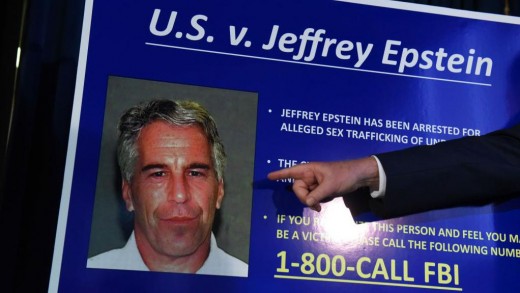The Epstein Memo: Why the DOJ’s Final Word Isn’t the Final Chapter

Introduction: The Epstein Case Isn’t Over—It’s Just Been Buried
Every so often, a criminal case comes along that massively shakes the headlines and fractures public trust. The Jeffrey Epstein saga is just the latest of these cases. From his sweetheart plea deal in 2008 to his suspicious death in a jail cell in 2019, Epstein's legacy is now more about what we're not being told than what we do know. Just this past weekend, the latest chapter dropped. A memo from the Department of Justice was leaked and it claimed that the "Epstein Investigation" was closed for good. There would be no new charges, no rumored "client list" and no sign of foul play.
However, for many this doesn't feel like a resolution. It feels like just the latest government cover-up. This memo, has opened the floodgates of doubt, frustration and anger, instead of putting the matter to rest.
The Memo: DOJ’s Final Word or Just Damage Control?
The memo was leaked to Axios, and claimed after reviewing all the available evidence, including thousands of images and videos - investigators found no basis to seek new charges. According to the DOJ's memo, there's also no evidence that Epstein ran a blackmail ring. There's also no indication that he maintained the rumored "client list" who engaged in sexual activity with underage girls.
In regard to Epstein's death, the memo reiterates the official claim Epstein died by suicide in his jail cell in 2019. The DOJ released over 10 hours of raw and "enhanced" surveillance footage to the public, which shows no one entering or exiting the area near his cell. Supposedly to prove that foul play was not involved. On paper, this seems like a thorough and exhaustive investigation. However, it raises more red flags than it resolves.
Why was the memo leaked to Axios, a news site that didn't spend much time investigating Epstein. Why did it leak during the Fourth of July weekend, when fewer people are paying attention. Why are so many key players involved, like Ghislaine Maxwell, still silent about what really happened.
Contradictions: When Promises Collide with Silence
While the Department of Justice may be done with the Epstein case, America's memory is not. That's because the government is contradicting itself with what we previously heard from their own officials for years. Just look at Attorney General Pam Bondi.
In 2024, Bondi went on national television, claiming she was reviewing Epstein's client list. She said it was on her desk, she even held it up as proof that the process was underway and that justice would be coming. She was making a claim as someone close to President Trump. Later, Bondi organized a meeting at the White House, bringing in top conservative influencers and handed them binders labeled "Epstein Files." The implication? Bombshell revelations were coming.
Truth be told, the binders contained nothing new - just documents the public already had access to. Bondi and the DOJ faced immediate scathing backlash from the conservative base. Bondi then shifted gears, blaming the FBI for withholding evidence. She claimed "truckloads" of documents have arrived and they were going to review it all. That sounded promising—until the DOJ memo flatly denied that any new evidence existed or would be released. And why would a sitting or former official risk so much by lying about something as consequential as Epstein’s client list?
The Video Evidence: Transparency or Diversion?
The surveillance footage was supposed to be the exclamation point on this story. The DOJ had released more than 10 hours of video footage from the night Epstein died, alleging it shows no one entered or left the restricted area where his cell was located. This footage covers the period from 10:40 p.m. on August 9, 2019, to 6:30 a.m. on August 10, when Epstein was found dead. However, not all is as it seems.
Internet watchdogs quickly pointed out what they allege are possible "jump cuts," altered time stamps, and sections that don't line up with what was previously reported. The footage didn't actually put doubts to rest. It had the opposite effect, it reignited theories that Epstein's death was orchestrated. After all, how often do the cameras malfunction the same time, while the guards also fall asleep. How does a man under suicide watch manage to hang himself in a federal prison.
The Victims: Still Silenced?
The most infuriating part of the story, is what hasn't happened, justice for the victims. The leaked memo claims that further disclosures are inappropriate because many files involve child abuse material. I understand, that content cannot be released. Nobody is asking for that. What the public really wants are names. They want to know who else was involved, who was on the island, who flew on the planes and who assaulted the girls.
There are survivors - many are grown adults - who have publicly accused the rich and powerful. One survivor, Virginia Giuffre, provided photographs, flight logs, and interviews detailing their abuse. However, these accounts are being increasingly dismissed, discredited or just ignored. Why hasn’t Ghislaine Maxwell been offered a reduced sentence in exchange for naming names? If she truly recruited underage girls for Epstein, are we expected to believe she never trafficked them to anyone else?
As Maxwell is in prison and Epstein is dead, are we supposed to believe they were the only ones responsible for one of the largest sex trafficking rings in modern history.
The Trust Gap: Why People Don’t Believe the Government
At the heart of this controversy is a crisis of trust. The government has fumbled this case ever since handing Epstein is sweetheart deal in 2008, which allowed him to serve 13 months in a cushy Florida jail, most of it on "work release." That deal even provided immunity to unnamed co-conspirators.
That should have been the red flag. Instead, it was the playbook. Now those same agencies that failed to protect the victims and fairly investigate the powerful, are telling us to trust them. They say there's nothing left to find. They dropped the message in the middle of a holiday weekend. Even people like Deputy Director of the FBI Dan Bongino are being second-guessed by their conservative followers. Mainly because nothing they promised has come true. Names have not been released and files weren't made public.
The Bigger Picture: Why It Matters
The Epstein case reflects the rotting at the core of elite protectionism. We are witnessing a slow-motion erasure of accountability. While Epstein may be dead, but the infrastructure that enabled him. Not issuing any more charges is a moral failure. When institutions refuse to pursue justice because it's inconvenient, they become shields for the powerful. This isn't just about Epstein, it's about how our justice system handles the powerful differently than the rest of us.
Ghislaine Maxwell was convicted of trafficking girls. Yet no one has been charged with raping them. That’s not just a loophole. That’s a message.
Final Thoughts: What We Deserve
We deserve more than a holiday weekend memo. We deserve to know those who were involved. We deserve a justice system that delivers fair justice. And we deserve a society that listens to victims, even when their stories are messy, inconsistent, or difficult to verify. Because the nature of abuse often is messy. Trauma doesn’t speak in clean, coherent narratives. But it does deserve to be heard. While the door is still open for justice and the truth to come out, it won't happen unless we keep pushing. Keep demanding.








